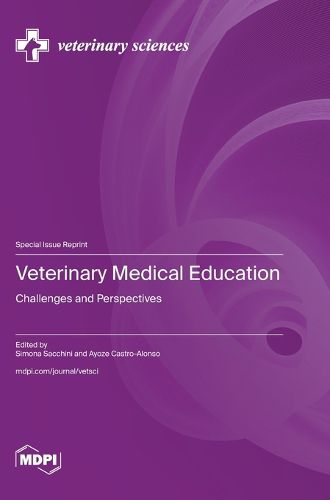Readings Newsletter
Become a Readings Member to make your shopping experience even easier.
Sign in or sign up for free!
You’re not far away from qualifying for FREE standard shipping within Australia
You’ve qualified for FREE standard shipping within Australia
The cart is loading…






This title is printed to order. This book may have been self-published. If so, we cannot guarantee the quality of the content. In the main most books will have gone through the editing process however some may not. We therefore suggest that you be aware of this before ordering this book. If in doubt check either the author or publisher’s details as we are unable to accept any returns unless they are faulty. Please contact us if you have any questions.
Veterinarians are valued and respected professional figures. Veterinary research transcends species boundaries and includes the study of both spontaneously occurring and experimentally induced models of both human and animal diseases. The COVID-19 pandemic has highlighted the importance of the One Health program, and this adaptive and responsive approach should be implemented in veterinary medical education. These fundamental changes in the roles, responsibilities, and spectrum of activities of veterinary professionals require equal changes, improvements, and adaptations to veterinary science and medical education training programs. These modifications may include, for instance, increasing the participation of veterinary professionals in multidisciplinary human medicine teaching, training, and research teams (i.e., human anatomy, physiology, or biology, among others). Significantly, recent scientific and technological breakthroughs (i.e., RNA-based vaccines, improved molecular diagnostic tools (PCRs), innovative ICTs applied to health assessment and research, etc.) have been seen to influence current teaching and training programs in key, modern, and innovative veterinary colleges and universities.
$9.00 standard shipping within Australia
FREE standard shipping within Australia for orders over $100.00
Express & International shipping calculated at checkout
This title is printed to order. This book may have been self-published. If so, we cannot guarantee the quality of the content. In the main most books will have gone through the editing process however some may not. We therefore suggest that you be aware of this before ordering this book. If in doubt check either the author or publisher’s details as we are unable to accept any returns unless they are faulty. Please contact us if you have any questions.
Veterinarians are valued and respected professional figures. Veterinary research transcends species boundaries and includes the study of both spontaneously occurring and experimentally induced models of both human and animal diseases. The COVID-19 pandemic has highlighted the importance of the One Health program, and this adaptive and responsive approach should be implemented in veterinary medical education. These fundamental changes in the roles, responsibilities, and spectrum of activities of veterinary professionals require equal changes, improvements, and adaptations to veterinary science and medical education training programs. These modifications may include, for instance, increasing the participation of veterinary professionals in multidisciplinary human medicine teaching, training, and research teams (i.e., human anatomy, physiology, or biology, among others). Significantly, recent scientific and technological breakthroughs (i.e., RNA-based vaccines, improved molecular diagnostic tools (PCRs), innovative ICTs applied to health assessment and research, etc.) have been seen to influence current teaching and training programs in key, modern, and innovative veterinary colleges and universities.